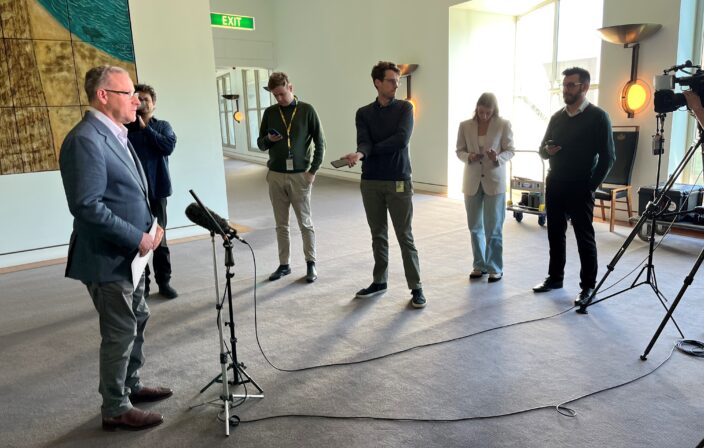Andrew McKellar panel interview with Karl Stefanovic and Brooke Boney, The Today Show
16 Jun 2022
|Transcripts
Event: Andrew McKellar panel interview with Karl Stefanovic and Brooke Boney, The Today Show.
Speakers: Andrew McKellar, chief executive Australian Chamber of Commerce and Industry; Sally McManus, secretary Australian Council of Trade Unions; Karl Stefanovic and Brooke Boney, hosts The Today Show.
Date: 16 June 2022.
Topics: Fair Work Commission annual wage review outcome, cost of living pressures, consumer spending, inflationary pressure on business, business profits, workforce shortages, delay for tourism, hospitality and aviation awards.
E&OE
Karl Stefanovic, host The Today Show: It was a landmark day for millions of workers, with the minimum wage gaining a 5.2 per cent boost. From Ryan Gosling to the minimum wage, it’s quite the transition. While for many, it is good news, small business owners who have battled the pandemic, staff shortages, and now inflation, are feeling even more pressure.
Brooke Boney, host The Today Show: Joining us now from Canberra is Andrew McKellar from the Australian Chamber of Commerce, and the Australian Council of Trade Union secretary, Sally McManus. Good morning, guys. Sally let’s start with you. Good news for workers?
Sally McManus, secretary Australian Council of Trade Unions: Yeah, look low paid workers need and deserve this pay increase. It’s still a real wage cut for people, but it’s keeping them close to the cost of living. We all know that everything’s gone up, especially for low paid workers. Rent as well as groceries and fuel and energy costs, and so this is really needed to keep people’s heads above water.
Brooke: Everything costs so much at the moment, is $40 a week really going to have an impact, do you reckon?
Sally: Look, I mean, if you are on $40,000 a year, which minimum wage workers are, $40 a week makes a big difference in terms of being able to cover your bills. For people above that, they’ll get around a 4.6 per cent pay increase, so it’s going to ease the stress on people. It’s still going to be a really difficult time for all working people, but it just means they’re not going to suffer as much as they might have.
Karl: Do you feel at all for small businesses, Sally, who have got to come up with the dough and eventually they’re going to have to pass that increased pressure onto customers?
Sally: Listen, I totally understand that a lot of small business owners will be thinking, “Oh, another thing that’s going up,” but I just say to them just look outside and all your customers, your customers who receive this pay increase will have money to spend in your business. If they don’t receive that pay increase, that’s less consumer confidence, less spending in your business. So whilst you are having to pay that for your workers, so is everyone else and so what comes around circulates.
Brooke: Andrew, what do you say to them?
Andrew McKellar, chief executive Australian Chamber of Commerce and Industry: Well, good morning. Look, we would say this is a risky decision. Of course, many people are looking out for a pay rise at this time. But as I think you mentioned, it’s not just the cost of living, that’s going up, it is the cost of doing business. And at the end of the day, this decision will add $7.9 billion of cost back into the bottom line for many businesses. So for many small businesses, they’re struggling with higher prices at the moment. They’re struggling to maintain supplies, input costs are going up, we’re seeing energy prices going through the roof at the moment. So look, this is another cost and at a time when we’re trying to struggle against inflation, it’s not the best thing for the economy.
Karl: It might add to it. I would say this, I don’t feel sorry for the bigger companies, and I don’t think anyone does, but it is the small business owner that has to come up with these extra costs. Is it true that some of them are just not going to make it through, or is that a beat up?
Andrew: Look, absolutely, Karl. I think you’ve hit the nail on the head. We have a two-speed economy. So in some sectors, mining and resources, we’re seeing commodity prices going through the roof at the moment. They’re doing reasonably well. They’re making good profits. But for small business, and let’s not forget, 98 per cent of all businesses are small businesses, that is where there’s a much greater struggle. And you just have to walk down the main street in any town, go into the CBDs and you’ll see that many of them are trying to keep their doors open at this time and that many people are putting their house under a mortgage to invest in their business. So we can’t see those costs going up much further.
Karl: Sally, the increase won’t come into effect for hospitality, tourism, and aviation sectors until October. So it’s not helping anyone in the short-term?
Sally: Yeah. Look, that is a problem, especially if you look at aviation at the moment. The only people who would receive this increase are the cleaners and the baggage handlers and it’s really hard to fill those positions at the moment and those workers really need the pay increase. The main thing I hear actually from businesses, including small businesses in particular, is being able to keep staff, the skill shortage is a huge issue. And most of them have already put up their wages by more than the 5 per cent and they’re not going to be affected by this. This is the absolute floor. So for anyone who’s not put up their wages, yes, they’re going to need to, but I think most businesses out there have had no choice, but to increase their wages, to keep people.
Karl: Andrew, it’s hard to see how this wouldn’t have flow on effects to the other levels, right, of paying. I can’t see how even beyond these levels, it’s not going to increase for other parts. Would you agree with that?
Andrew: Absolutely. Again, this is not an increase that just goes to the 180,000 or so lowest paid workers, the ones that are on the minimum wage. It cascades through the award system. It will end up flowing through to 2.6 million workers quite quickly. Now, the issue with that is it’s really one-size-fits-all and I think that’s where we have a problem. It’s not tailored to the particular circumstances that individual businesses are going to be facing.
Karl: Difficult times. Appreciate both your perspectives this morning. Thank you.


